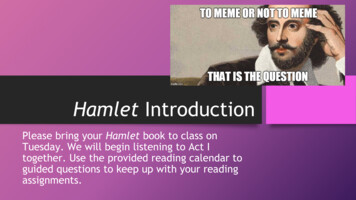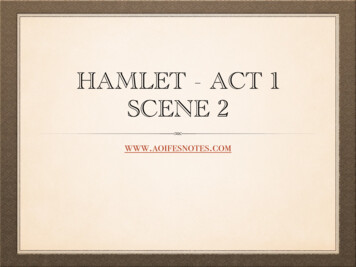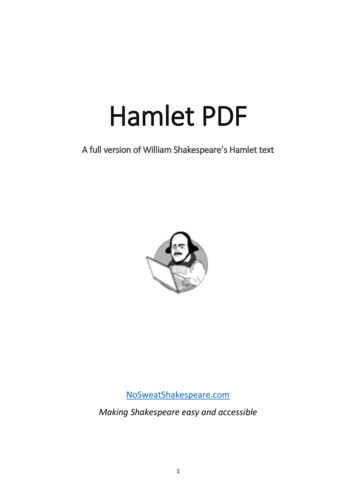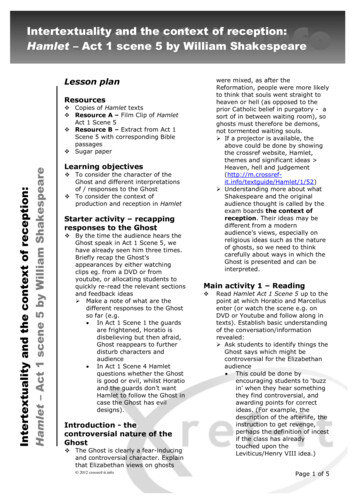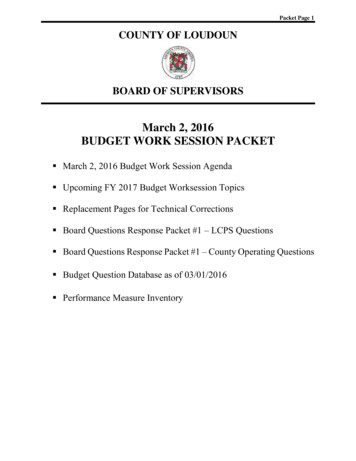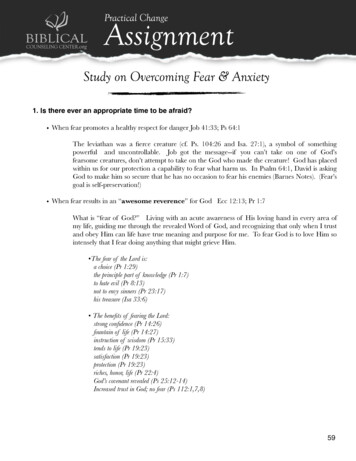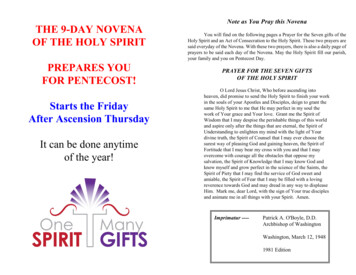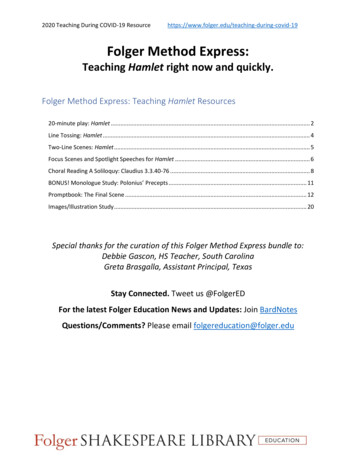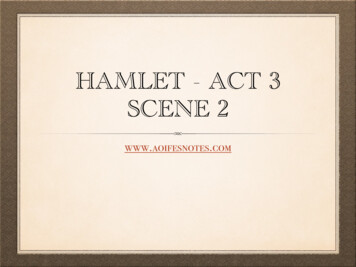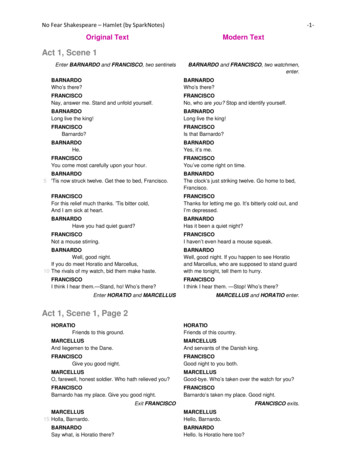
Transcription
No Fear Shakespeare – Hamlet (by SparkNotes)-1-Original TextModern TextAct 1, Scene 1Enter BARNARDO and FRANCISCO, two sentinelsBARNARDO and FRANCISCO, two watchmen,enter.BARNARDOWho’s there?BARNARDOWho’s there?FRANCISCONay, answer me. Stand and unfold yourself.FRANCISCONo, who are you? Stop and identify yourself.BARNARDOLong live the king!BARNARDOLong live the king!FRANCISCOBarnardo?FRANCISCOIs that Barnardo?BARNARDOHe.BARNARDOYes, it’s me.FRANCISCOYou come most carefully upon your hour.FRANCISCOYou’ve come right on time.BARNARDO5 'Tis now struck twelve. Get thee to bed, Francisco.BARNARDOThe clock’s just striking twelve. Go home to bed,Francisco.FRANCISCOFor this relief much thanks. 'Tis bitter cold,And I am sick at heart.FRANCISCOThanks for letting me go. It’s bitterly cold out, andI’m depressed.BARNARDOHave you had quiet guard?BARNARDOHas it been a quiet night?FRANCISCONot a mouse stirring.FRANCISCOI haven’t even heard a mouse squeak.BARNARDOWell, good night.If you do meet Horatio and Marcellus,10 The rivals of my watch, bid them make haste.FRANCISCOI think I hear them.—Stand, ho! Who’s there?Enter HORATIO and MARCELLUSBARNARDOWell, good night. If you happen to see Horatioand Marcellus, who are supposed to stand guardwith me tonight, tell them to hurry.FRANCISCOI think I hear them. —Stop! Who’s there?MARCELLUS and HORATIO enter.Act 1, Scene 1, Page 2HORATIOFriends to this ground.HORATIOFriends of this country.MARCELLUSAnd liegemen to the Dane.MARCELLUSAnd servants of the Danish king.FRANCISCOGive you good night.FRANCISCOGood night to you both.MARCELLUSO, farewell, honest soldier. Who hath relieved you?MARCELLUSGood-bye. Who’s taken over the watch for you?FRANCISCOBarnardo has my place. Give you good night.FRANCISCOBarnardo’s taken my place. Good night.Exit FRANCISCOMARCELLUS15 Holla, Barnardo.BARNARDOSay what, is Horatio there?FRANCISCO exits.MARCELLUSHello, Barnardo.BARNARDOHello. Is Horatio here too?
No Fear Shakespeare – Hamlet (by SparkNotes)-2-Original TextModern TextHORATIOA piece of him.HORATIOMore or less.BARNARDOWelcome, Horatio.—Welcome, good Marcellus.BARNARDOWelcome, Horatio. Welcome, Marcellus.MARCELLUSWhat, has this thing appeared again tonight?MARCELLUSSo, tell us, did you see that thing again tonight?BARNARDO20 I have seen nothing.BARNARDOI haven’t seen anything.MARCELLUSHoratio says ’tis but our fantasyAnd will not let belief take hold of himTouching this dreaded sight twice seen of us.Therefore I have entreated him along25 With us to watch the minutes of this night,That if again this apparition comeHe may approve our eyes and speak to it.MARCELLUSHoratio says we’re imagining it, and won’t lethimself believe anything about this horrible thingthat we’ve seen twice now. That’s why I’vebegged him to come on our shift tonight, so that ifthe ghost appears he can see what we see andspeak to it.HORATIOTush, tush, ’twill not appear.HORATIOOh, nonsense. It’s not going to appear.Act 1, Scene 1, Page 3BARNARDOSit down a whileAnd let us once again assail your ears,30 That are so fortified against our story,What we have two nights seen.BARNARDOSit down for a while, and we’ll tell you again thestory you don’t want to believe, about what we’veseen two nights now.HORATIOWell, sit we down,And let us hear Barnardo speak of this.HORATIOWell, let’s sit down and listen to Barnardo tell us.BARNARDOLast night of all,When yond same star that’s westward from the pole35 Had made his course t' illume that part of heavenWhere now it burns, Marcellus and myself,The bell then beating one—BARNARDOLast night, when that star to the west of the NorthStar had traveled across the night sky to thatpoint where it’s shining now, at one o'clock,Marcellus and I—Enter GHOSTThe GHOST enters.MARCELLUSPeace, break thee off. Look where it comes again!MARCELLUSQuiet, shut up! It’s come again.BARNARDOIn the same figure like the king that’s dead.BARNARDOLooking just like the dead king.MARCELLUS40 (to HORATIO) Thou art a scholar. Speak to it,Horatio.MARCELLUS(to HORATIO) You’re well-educated, Horatio. Saysomething to it.BARNARDOLooks it not like the king? Mark it, Horatio.BARNARDODoesn’t he look like the king, Horatio?HORATIOMost like. It harrows me with fear and wonder.HORATIOVery much so. It’s terrifying.BARNARDOIt would be spoke to.BARNARDOIt wants us to speak to it.MARCELLUSQuestion it, Horatio.MARCELLUSAsk it something, Horatio.
No Fear Shakespeare – Hamlet (by SparkNotes)Original Text-3-Modern TextHORATIOWhat art thou that usurp’st this time of night45 Together with that fair and warlike formIn which the majesty of buried DenmarkDid sometimes march? By heaven, I charge thee,speak.HORATIOWhat are you, that you walk out so late at night,looking like the dead king of Denmark when hedressed for battle? By God, I order you to speak.Act 1, Scene 1, Page 4MARCELLUSIt is offended.MARCELLUSIt looks like you’ve offended it.BARNARDOSee, it stalks away.BARNARDOLook, it’s going away.HORATIOStay! Speak, speak! I charge thee, speak!HORATIOStay! Speak! Speak! I order you, speak!Exit GHOSTMARCELLUS50 'Tis gone and will not answer.BARNARDOHow now, Horatio? You tremble and look pale.Is not this something more than fantasy?What think you on ’t?HORATIOBefore my God, I might not this believe55 Without the sensible and true avouchOf mine own eyes.MARCELLUSIs it not like the king?The GHOST exits.MARCELLUSIt’s gone. It won’t answer now.BARNARDOWhat’s going on, Horatio? You’re pale andtrembling. You agree now that we’re notimagining this, don’t you? What do you thinkabout it?HORATIOI swear to God, if I hadn’t seen this with my owneyes I’d never believe it.MARCELLUSDoesn’t it look like the king?HORATIOAs thou art to thyself.Such was the very armour he had on60 When he the ambitious Norway combated.So frowned he once when, in an angry parle,He smote the sledded Polacks on the ice.'Tis strange.HORATIOYes, as much as you look like yourself. The kingwas wearing exactly this armor when he foughtthe king of Norway. And the ghost frowned justlike the king did once when he attacked thePoles, traveling on the ice in sleds. It’s weird.MARCELLUSThus twice before, and jump at this dead hour,65 With martial stalk hath he gone by our watch.MARCELLUSIt’s happened like this twice before, always at thisexact time. He stalks by us at our post like awarrior.HORATIOIn what particular thought to work I know not,But in the gross and scope of mine opinionThis bodes some strange eruption to our state.HORATIOI don’t know exactly how to explain this, but Ihave a general feeling this means bad news forour country.Act 1, Scene 1, Page 5MARCELLUSGood now, sit down and tell me, he that knows,70 Why this same strict and most observant watchSo nightly toils the subject of the land,And why such daily cast of brazen cannonAnd foreign mart for implements of war,MARCELLUSAll right, let’s sit down and discuss that question.Somebody tell me why this strict schedule ofguards has been imposed, and why so manybronze cannons are being manufactured inDenmark, and so many weapons bought from
No Fear Shakespeare – Hamlet (by SparkNotes)Original TextWhy such impress of shipwrights, whose sore task75 Does not divide the Sunday from the week.What might be toward, that this sweaty hasteDoth make the night joint laborer with the day?Who is ’t that can inform me?80859095100HORATIOThat can I.At least, the whisper goes so: our last king,Whose image even but now appeared to us,Was, as you know, by Fortinbras of Norway,Thereto pricked on by a most emulate pride,Dared to the combat; in which our valiant Hamlet(For so this side of our known world esteemed him)Did slay this Fortinbras, who by a sealed compactWell ratified by law and heraldry,Did forfeit, with his life, all those his landsWhich he stood seized of to the conqueror,Against the which a moiety competentWas gagèd by our king, which had returnedTo the inheritance of FortinbrasHad he been vanquisher, as, by the same covenantAnd carriage of the article designed,His fell to Hamlet. Now, sir, young Fortinbras,Of unimprovèd mettle hot and full,Hath in the skirts of Norway here and thereSharked up a list of lawless resolutes,For food and diet, to some enterpriseThat hath a stomach in ’t, which is no other—As it doth well appear unto our state—But to recover of us, by strong hand-4-Modern Textabroad, and why the shipbuilders are so busythey don’t even rest on Sunday. Is somethingabout to happen that warrants working this nightand day? Who can explain this to me?HORATIOI can. Or at least I can describe the rumors. Asyou know, our late king, whom we just now sawas a ghost, was the great rival of Fortinbras, kingof Norway. Fortinbras dared him to battle. In thatfight, our courageous Hamlet (or at least that’show we thought of him) killed old KingFortinbras, who—on the basis of a valid legaldocument—surrendered all his territories, alongwith his life, to his conqueror. If our king had lost,he would have had to do the same. But now oldFortinbras’s young son, also called Fortinbras—he is bold, but unproven—has gathered a bunchof thugs from the lawless outskirts of the country.For some food, they’re eager to take on thetough enterprise of securing the lands the elderFortinbras lost.Act 1, Scene 1, Page 6And terms compulsatory, those foresaid landsSo by his father lost. And this, I take it,Is the main motive of our preparations,105 The source of this our watch, and the chief headOf this posthaste and rummage in the land.As far as I understand, that’s why we’re postedhere tonight and why there’s such a commotionin Denmark lately.BARNARDOI think it be no other but e'en so.Well may it sort that this portentous figureComes armèd through our watch so like the king110 That was and is the question of these wars.BARNARDOI think that’s exactly right—that explains why theghost of the late king would haunt us now, sincehe caused these wars.HORATIOA mote it is to trouble the mind’s eye.In the most high and palmy state of Rome,A little ere the mightiest Julius fell,The graves stood tenantless and the sheeted dead115 Did squeak and gibber in the Roman streetsAs stars with trains of fire and dews of blood,Disasters in the sun, and the moist starUpon whose influence Neptune’s empire standsWas sick almost to doomsday with eclipse.120 And even the like precurse of feared events,As harbingers preceding still the fatesHORATIOThe ghost is definitely something to worry about.In the high and mighty Roman Empire, justbefore the emperor Julius Caesar wasassassinated, corpses rose out of their gravesand ran through the streets of Rome speakinggibberish. There were shooting stars, and bloodmixed in with the morning dew, and threateningsigns on the face of the sun. The moon, whichcontrols the tides of the sea, was so eclipsed italmost went completely out. And we’ve hadsimilar omens of terrible things to come, as if
No Fear Shakespeare – Hamlet (by SparkNotes)-5-Original TextModern TextAnd prologue to the omen coming on,Have heaven and earth together demonstratedUnto our climatures and countrymen.heaven and earth have joined together to warnus what’s going to happen.Enter GHOST125 But soft, behold! Lo, where it comes again.I’ll cross it though it blast me.—Stay, illusion!The GHOST enters.Wait, look! It has come again. I’ll meet it if it’s thelast thing I do. —Stay here, you hallucination!GHOST spreads his armsIf thou hast any sound or use of voice,Speak to me.The GHOST spreads his arms.If you have a voice or can make sounds, speakto me.Act 1, Scene 1, Page 7If there be any good thing to be done130 That may to thee do ease and grace to me,Speak to me.If thou art privy to thy country’s fate,Which happily foreknowing may avoid,Oh, speak!135 Or if thou hast uphoarded in thy lifeExtorted treasure in the womb of earth,For which, they say, you spirits oft walk in death,Speak of it. Stay and speak!If there’s any good deed I can do that will bringyou peace and me honor, speak to me. If youhave some secret knowledge of your country’ssad fate—which might be avoided if we knewabout it—then, please, speak. Or if you’ve gotsome buried treasure somewhere, which theysay often makes ghosts restless, then tell usabout it. Stay and speak!The cock crows—Stop it, Marcellus.A rooster crows.Keep it from leaving, Marcellus.MARCELLUSShall I strike at it with my partisan?MARCELLUSShould I strike it with my spear?HORATIO140 Do, if it will not stand.HORATIOYes, if it doesn’t stand still.BARNARDO'Tis here.BARNARDOIt’s over here.HORATIO'Tis here.HORATIOThere it is.Exit GHOSTMARCELLUS'Tis gone.We do it wrong, being so majestical,To offer it the show of violence,For it is, as the air, invulnerable,145 And our vain blows malicious mockery.BARNARDOIt was about to speak when the cock crew.The GHOST exits.MARCELLUSIt’s gone. We were wrong to threaten it withviolence, since it looks so much like a king.Besides, we can’t hurt it anymore than we canhurt the air. Our attack was stupid, futile, andwicked.BARNARDOIt was about to say something when the roostercrowed.Act 1, Scene 1, Page 8HORATIOAnd then it started like a guilty thingUpon a fearful summons. I have heardThe cock, that is the trumpet to the morn,150 Doth with his lofty and shrill-sounding throatAwake the god of day, and, at his warning,Whether in sea or fire, in earth or air,HORATIOAnd then it acted startled, like a guilty personcaught by the law. I’ve heard that the roosterawakens the god of day with its trumpetlikecrowing, and makes all wandering ghosts,wherever they are, hurry back to their hidingplaces. We’ve just seen proof of that.
No Fear Shakespeare – Hamlet (by SparkNotes)Original Text-6-Modern TextTh' extravagant and erring spirit hiesTo his confine, and of the truth herein155 This present object made probation.MARCELLUSIt faded on the crowing of the cock.Some say that ever 'gainst that season comesWherein our Saviour’s birth is celebrated,The bird of dawning singeth all night long.160 And then, they say, no spirit dare stir abroad.The nights are wholesome. Then no planets strike,No fairy takes, nor witch hath power to charm,So hallowed and so gracious is that time.MARCELLUSYes, it faded away when the rooster crowed.Some people say that just before Christmas therooster crows all night long, so that no ghostdares go wandering, and the night is safe. Theplanets have no sway over us, fairies' spellsdon’t work, and witches can’t bewitch us. That’show holy that night is.HORATIOSo have I heard and do in part believe it.165 But look, the morn, in russet mantle clad,Walks o'er the dew of yon high eastward hill.Break we our watch up, and by my advice,Let us impart what we have seen tonightUnto young Hamlet, for, upon my life,170 This spirit, dumb to us, will speak to him.Do you consent we shall acquaint him with it,As needful in our loves, fitting our duty?HORATIOYes, I’ve heard the same thing and sort ofbelieve it. But look, morning is breaking beyondthat hill in the east, turning the sky red. Let’sinterrupt our watch and go tell young Hamletwhat we’ve seen tonight. I’m sure this ghostthat’s so silent with us will speak to him. Don’tyou agree that we owe it to him to tell him aboutthis, out of duty and love?MARCELLUSLet’s do ’t, I pray, and I this morning knowWhere we shall find him most conveniently.MARCELLUSLet’s do it. I know where we’ll find him thismorning.ExeuntThey exit.Enter CLAUDIUS, king of Denmark; GERTRUDEthequeen; HAMLET; POLONIUS; his sonLAERTES;and his daughter OPHELIA; LORDSattendantCLAUDIUS, the king of Denmark, enters, alongwith GERTRUDE thequeen, HAMLET,POLONIUS, POLONIUS ’sson LAERTES and daughter OPHELIA,and LORDS who wait on the king.Act 1, Scene 2CLAUDIUSThough yet of Hamlet our dear brother’s deathThe memory be green, and that it us befittedTo bear our hearts in grief and our whole kingdomTo be contracted in one brow of woe,5 Yet so far hath discretion fought with natureThat we with wisest sorrow think on himTogether with remembrance of ourselves.Therefore our sometime sister, now our queen,Th' imperial jointress to this warlike state,10 Have we—as ’twere with a defeated joy,With an auspicious and a dropping eye,With mirth in funeral and with dirge in marriage,In equal scale weighing delight and dole—Taken to wife. Nor have we herein barred15 Your better wisdoms, which have freely goneWith this affair along. For all, our thanks.Now follows that you know. Young Fortinbras,Holding a weak supposal of our worthOr thinking by our late dear brother’s deathCLAUDIUSAlthough I still have fresh memories of my brotherthe elder Hamlet’s death, and though it wasproper to mourn him throughout our kingdom, lifestill goes on—I think it’s wise to mourn him whilealso thinking about my own well being. Therefore,I’ve married my former sister-in-law, the queen,with mixed feelings of happiness and sadness. Iknow that in marrying Gertrude I’m only doingwhat all of you have wisely advised all along—forwhich I thank you. Now, down to business. Youall know what’s happening. Young Fortinbras,underestimating my strength or imagining that thedeath of the king has thrown my country intoturmoil, dreams of getting the better of me, andnever stops pestering me with demands that Isurrender the territory his father lost to the elderHamlet, my dead brother-in-law. So much forFortinbras.
No Fear Shakespeare – Hamlet (by SparkNotes)Original Text-7-Modern Text20 Our state to be disjoint and out of frame,Colleaguèd with the dream of his advantage,He hath not failed to pester us with messageImporting the surrender of those landsLost by his father, with all bonds of law,25 To our most valiant brother. So much for him.Enter VOLTEMAND and CORNELIUSNow for ourself and for this time of meetingVOLTEMAND and CORNELIUS enter.Now, here’s what needs to be done.Act 1, Scene 2, Page 2Thus much the business is: we have here writTo Norway, uncle of young Fortinbras—Who, impotent and bedrid, scarcely hears30 Of this his nephew’s purpose—to suppressHis further gait herein, in that the levies,The lists, and full proportions are all madeOut of his subject; and we here dispatchYou, good Cornelius, and you, Voltemand,35 For bearers of this greeting to old Norway,Giving to you no further personal powerTo business with the king more than the scopeOf these dilated articles allow. (gives them a paper)Farewell, and let your haste commend your duty.I’ve written to Fortinbras’s uncle, the presenthead of Norway, an old bedridden man whoknows next to nothing about his nephew’s plans.I’ve told the uncle to stop those plans, which hehas the power to do, since all the troopsassembled by young Fortinbras are Norwegian,and thus under the uncle’s control. I’m giving thejob of delivering this letter to you, good Cornelius,and you, Voltemand. Your business in Norwaywill be limited to this task. (he gives them apaper) Now good-bye. Show your loyalty byleaving quickly, rather than with elaboratespeeches.CORNELIUS, VOLTEMAND40 In that and all things will we show our duty.CORNELIUS, VOLTEMANDWe’ll do our duty to you in that and everythingelse.CLAUDIUSWe doubt it nothing. Heartily farewell.Exeunt VOLTEMAND and CORNELIUSCLAUDIUSI have no doubt you will. Good-bye.CORNELIUS and VOLTEMAND exit.And now, Laertes, what’s the news with you?You told us of some suit. What is ’t, Laertes?You cannot speak of reason to the Dane45 And lose your voice. What wouldst thou beg, Laertes,That shall not be my offer, not thy asking?The head is not more native to the heart,The hand more instrumental to the mouth,Than is the throne of Denmark to thy father.50 What wouldst thou have, Laertes?And now, Laertes, what do you have to tell me?You have a favor you to ask of me. What is it,Laertes? You’ll never waste your words whentalking to the king of Denmark. What could youever ask for that I wouldn’t give you? Your fatherand the Danish throne are as close as the mindand the heart, or the hand and the mouth. Whatwould you like, Laertes?LAERTESMy dread lord,Your leave and favor to return to France,From whence though willingly I came to DenmarkTo show my duty in your coronation,Yet now, I must confess, that duty done,55 My thoughts and wishes bend again toward FranceAnd bow them to your gracious leave and pardon.LAERTESMy lord, I want your permission to go back toFrance, which I left to come to Denmark for yourcoronation. I confess, my thoughts are on France,now that my duty is done. Please, let me go.Act 1, Scene 2, Page 3CLAUDIUSHave you your father’s leave? What says Polonius?CLAUDIUSDo you have your father’s permission? Whatdoes Polonius say?
No Fear Shakespeare – Hamlet (by SparkNotes)Original TextPOLONIUSHe hath, my lord, wrung from me my slow leaveBy laborsome petition, and at last60 Upon his will I sealed my hard consent.I do beseech you, give him leave to go.CLAUDIUSTake thy fair hour, Laertes. Time be thine,And thy best graces spend it at thy will.—But now, my cousin Hamlet, and my son—HAMLET65 (aside) A little more than kin and less than kind.-8-Modern TextPOLONIUSMy son has worn me down by asking me somany times. In the end I grudgingly consented. Ibeg you, let him go.CLAUDIUSIn that case, leave when you like, Laertes, andspend your time however you wish. I hereby grantyour request, and hope you have a good time.And now, Hamlet, my nephew and my son—HAMLET(speaking so no one else can hear) Too manyfamily ties there for me.CLAUDIUSHow is it that the clouds still hang on you?CLAUDIUSWhy are you still so gloomy, with a cloud hangingover you?HAMLETNot so, my lord. I am too much i' the sun.HAMLETIt’s not true, sir. Your son is out in the sun.GERTRUDEGood Hamlet, cast thy nighted color off,And let thine eye look like a friend on Denmark.70 Do not forever with thy vailèd lidsSeek for thy noble father in the dust.Thou know’st ’tis common. All that lives must die,Passing through nature to eternity.GERTRUDEMy dear Hamlet, stop wearing these blackclothes, and be friendly to the king. You can’tspend your whole life with your eyes to theground remembering your noble father. Ithappens all the time, what lives must dieeventually, passing to eternity.HAMLETAy, madam, it is common.HAMLETYes, mother, it happens all the time.GERTRUDEGERTRUDESo why does it seem so particular to you?If it be,75 Why seems it so particular with thee?Act 1, Scene 2, Page 4HAMLET“Seems,” madam? Nay, it is. I know not “seems.”'Tis not alone my inky cloak, good mother,Nor customary suits of solemn black,Nor windy suspiration of forced breath,80 No, nor the fruitful river in the eye,Nor the dejected 'havior of the visage,Together with all forms, moods, shapes of grief,That can denote me truly. These indeed “seem,”For they are actions that a man might play.85 But I have that within which passeth show,These but the trappings and the suits of woe.HAMLET“Seem,” mother? No, it is. I don’t know what youmean by “seem.” Neither my black clothes, mydear mother, nor my heavy sighs, nor myweeping, nor my downcast eyes, nor any otherdisplay of grief can show what I really feel. It’strue that all these things “seem” like grief, since aperson could use them to fake grief if he wantedto. But I’ve got more real grief inside me that youcould ever see on the surface. These clothes arejust a hint of it.CLAUDIUS'Tis sweet and commendable in your nature, Hamlet,To give these mourning duties to your father.But you must know your father lost a father,90 That father lost, lost his, and the survivor boundIn filial obligation for some termTo do obsequious sorrow. But to perseverIn obstinate condolement is a courseCLAUDIUSHamlet, you are so sweet and such a good sonto mourn your father like this. But you have toremember, that your father lost his father, wholost his father before him, and every time, eachson has had to mourn his father for a certainperiod. But overdoing it is just stubborn. It’s notmanly. It’s not what God wants, and it betrays a
No Fear Shakespeare – Hamlet (by SparkNotes)Original TextOf impious stubbornness. 'Tis unmanly grief.95 It shows a will most incorrect to heaven,A heart unfortified, a mind impatient,An understanding simple and unschooled.For what we know must be and is as commonAs any the most vulgar thing to sense,100 Why should we in our peevish oppositionTake it to heart? Fie! 'Tis a fault to heaven,A fault against the dead, a fault to nature,To reason most absurd, whose common themeIs death of fathers, and who still hath cried,105 From the first corse till he that died today,“This must be so.” We pray you, throw to earthThis unprevailing woe, and think of usAs of a father. For let the world take note,You are the most immediate to our throne,-9-Modern Textvulnerable heart and an ignorant and weak mind.Since we know that everyone must die sooner orlater, why should we take it to heart? You’recommitting a crime against heaven, against thedead, and against nature. And it’s irration-al,since the truth is that all fathers must die. Pleasegive up this useless mourning of yours and startthinking of me as your new father.Act 1, Scene 2, Page 5110 And with no less nobility of loveThan that which dearest father bears his sonDo I impart toward you. For your intentIn going back to school in Wittenberg,It is most retrograde to our desire.115 And we beseech you, bend you to remainHere in the cheer and comfort of our eye,Our chiefest courtier, cousin, and our son.GERTRUDELet not thy mother lose her prayers, Hamlet.I pray thee, stay with us. Go not to Wittenberg.Because everyone knows that you are the manclosest to this throne, and I love you just as muchas any father loves his son. And your plans forgoing back to Wittenberg are not what I want. I’masking you now to stay here in my company asthe number-one member of my court, mynephew and now my son too.GERTRUDEPlease answer my prayers, Hamlet, and staywith us. Don’t go back to Wittenberg.HAMLET120 I shall in all my best obey you, madam.HAMLETI’ll obey you as well as I can, ma'am.CLAUDIUSWhy, ’tis a loving and a fair reply.Be as ourself in Denmark.—Madam, come.This gentle and unforced accord of HamletSits smiling to my heart, in grace whereof125 No jocund health that Denmark drinks todayBut the great cannon to the clouds shall tell,And the king’s rouse the heavens shall bruit again,Respeaking earthly thunder. Come away.CLAUDIUSThat’s the right answer—it shows your love. Stayin Denmark like us.—My dear wife, come.Hamlet’s agreeing to stay makes me happy, andevery merry toast I’ll drink today will be heard asfar as the clouds overhead. My drinking will beechoed in the heavens. Let’s go.Flourish. Exeunt all but HAMLETHAMLETOh, that this too, too sullied flesh would melt,130 Thaw, and resolve itself into a dew,Or that the Everlasting had not fixedHis canon 'gainst self-slaughter! O God, God!How weary, stale, flat, and unprofitableSeem to me all the uses of this world!135 Fie on ’t, ah fie! 'Tis an unweeded gardenThat grows to seed. Things rank and gross in naturePossess it merely. That it should come to this.But two months dead—nay, not so much, not two.So excellent a king, that was to thisTrumpets play. Everyone except HAMLET exits.HAMLETAh, I wish my dirty flesh could melt away into avapor, or that God had not made a law againstsuicide. Oh God, God! How tired, stale, andpointless life is to me. Damn it! It’s like a gardenthat no one’s taking care of, and that’s growingwild. Only nasty weeds grow in it now. I can’tbelieve it’s come to this. My father’s only beendead for two months—no, not even two. Such anexcellent king, as superior to my uncle as a godis to a beast, and so loving toward my motherthat he kept the wind from blowing too hard on
No Fear Shakespeare – Hamlet (by SparkNotes)-10-Original Text140 Hyperion to a satyr. So loving to my motherModern Texther face.Act 1, Scene 2, Page 6That he might not beteem the winds of heavenVisit her face too roughly.—Heaven and earth,Must I remember? Why, she would hang on himAs if increase of appetite had grown145 By what it fed on, and yet, within a month—Let me not think on ’t. Frailty, thy name is woman!—A little month, or ere those shoes were oldWith which she followed my poor father’s body,Like Niobe, all tears. Why she, even she—150 O God, a beast that wants discourse of reasonWould have mourned longer!—married with myuncle,My father’s brother, but no more like my fatherThan I to Hercules. Within a month,155 Ere yet the salt of most unrighteous tearsHad left the flushing in her gallèd eyes,She married. O most wicked speed, to postWith such dexterity to incestuous sheets!It is not nor it cannot come to good,But break, my heart, for I must hold my tongue.Oh God, do I have to remember that? She wouldhang on to him, and the more she was with himthe more she wanted to be with him; she couldn’tget enough of him. Yet even so, within a monthof my father’s death (I don’t even want to thinkabout it. Oh women! You are so weak!), evenbefore she had broken in the shoes she wore tohis funeral, crying like crazy—even an animalwould have mourned its mate longer than shedid!—there she was marrying my uncle, myfather’s brother, who’s about as much like myfather as I’m like Hercules. Less than a monthafter my father’s death, even before the tears onher cheeks had dried, she remarried. Oh, soquick to jump into a bed of incest! That’s notgood, and no good can come of it either. But myheart must break in silence, since I can’t mentionmy feelings aloud.Enter HORATIO, MARCELLUS, and BARNARDOHORATIO160 Hail to your lordship.HORATIO, MARCELLUS,and BARNARDOenter.HORATIOHello, sir.HAMLETI am glad to see you well.—Horatio? Or I do forget myself?HAMLETNice to see you again, Horatio—that is yourname, right?HORATIOThe same, my lord, and your poor servant ever.HORATIOThat’s me, sir. Still your respectful servant.HAMLETSir, my good friend, I’ll change that name with you.And what make you from Wittenberg, Horatio?—165 Marcellus!MARCELLUSMy good lord.HAMLETNot my servant, but my friend. I’ll change thatname for you. But what are you doing so far fromWittenberg, Horatio? —Oh, Marcellus?MARCELLUSHello, sir.Act 1
fight, our courageous Hamlet (or at least that’s how we thought of him) killed old King Fortinbras, who—on the basis of a valid legal document—surrendered all his territories, along with his life, to his conqueror. If our king had lost, he would have had to do the same. Bu
